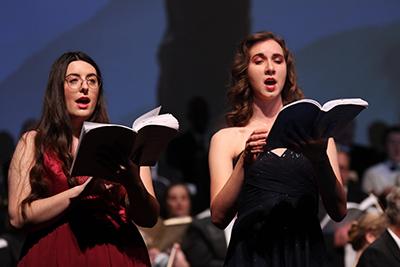
MINOT, N.D. – “Messiah,” an oratorio by George F. Handel, has been performed on the Minot State campus for almost a hundred years. Welcome it back from a year hiatus on Sunday, Dec. 5 at 4 p.m. in Ann Nicole Nelson Hall.
Eloise Ogden summarized the history of MSU’s long tradition in a 1979 edition of The Minot Daily News, celebrating the 50th anniversary of the “Messiah” on campus. The earliest recounting of a performance of it in Minot, according to the article, was in 1908 with the Minot Choral Club. Minot State, at the time still Minot State College, first performed it on Dec. 19, 1929, under the direction of Jean Gilbert Jones.
“It was a very stormy night,” said Ernest Livingston, member of the first chorus. “The audience was very small with not many more in attendance than were in the choir.”
Today, Ann Nicole Nelson Hall’s production is much larger, with participants from the Heritage Singers, the Minot Chamber Chorale, the MSU Concert Choir, and the Minot Symphony Orchestra. Soloists for this year’s performance include alumna Karen Langemo, students Christina Larsen and Katelyn Pigeon, and Raquel Winnica, Cole Girodat, and Philip Zawisza from outside the Minot community.

Director of Choral Activities and Assistant Professor of Music Emerson Eads notes the larger purpose behind the tradition on campus.
“One of the wonderful things about this tradition, that is nearly a century old here in Minot, is that it affords students the opportunity to sing with professionals, for parents to sing with their children, and for the community to come together to sing the utterly fantastic ‘Messiah,’ all for the purpose of providing a love offering to the student scholarships here at Minot State,” he said. “This year, the Heritage Singers, who have been bringing this together for some time now, have chosen the Ken (choral professor emeritus) and DeVera Bowles (voice professor) Scholarship fund.”
Handel’s piece itself also follows some traditions. Since its debut in Dublin, Ireland in 1742, the audience traditionally stands up for the performance of the final “Hallelujah” chorus. As the story goes, King George II was so impressed by the initial finale, he rose to his feet with joy. As a sign of respect, it is custom to stand whenever members of the British monarchy stand or enter a room, so the audience followed the king and rose with him. Attend the concert in Ann Nicole Nelson Hall and participate in this tradition as well.
Performances of the “Messiah” in Minot are not often cancelled. Between 1949 and 1975, only one cancellation of the “Messiah” at MSU was reported; there was a blizzard in 1967. After being forced to skip last year’s performance due to COVID-19 restrictions, Eads reflects on the greater meanings behind tradition.
“Everyone is perhaps a bit dusty, but I think it has made us all the hungrier to really bite into these choruses that were always meant for the amateur and professional alike, which is why the ‘Messiah’ continues to be an annual event all over the world for centuries,” he said. “From community gatherings to professional ones, these choruses and arias remind us that we’re connected, not just to the 18th century audiences, but to each other.”
About Minot State University
Minot State University is a public university dedicated to excellence in education, scholarship, and community engagement achieved through
rigorous academic experiences, active learning environments, commitment to public service, and a vibrant campus life.
Published: 12/02/21




